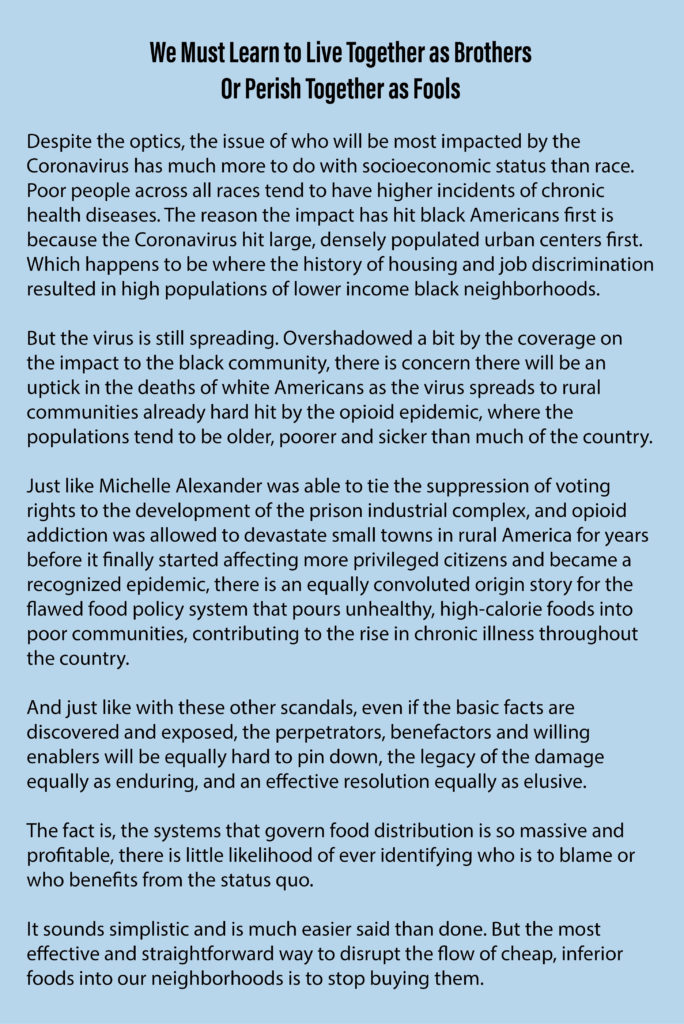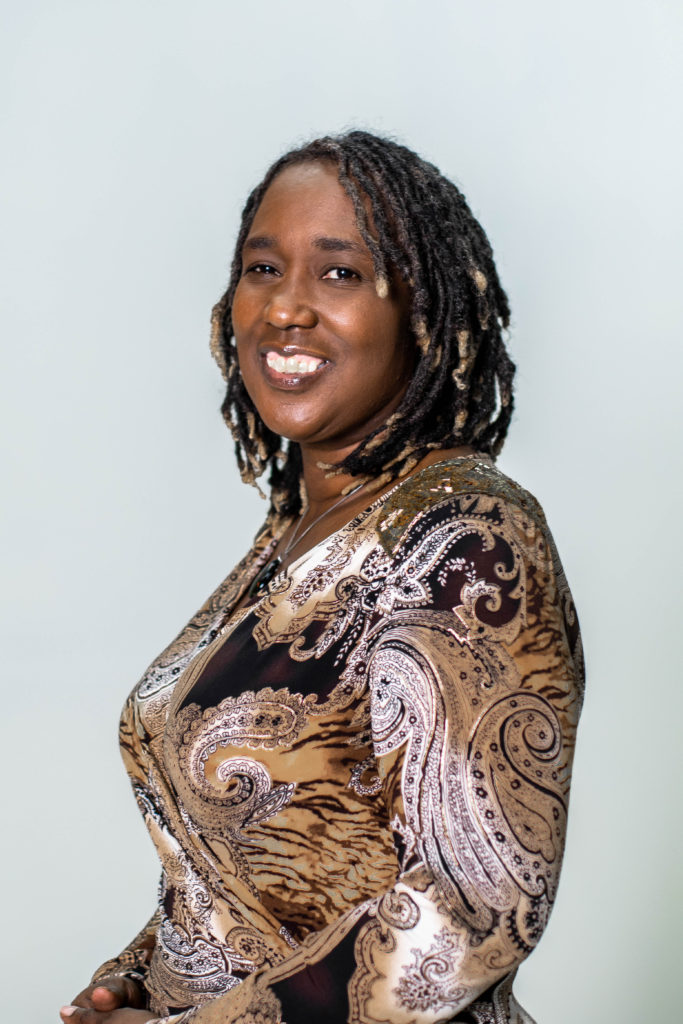An analysis published in the Washington Post has sparked a wave of reporting about the disparate impact the Coronavirus has had on African Americans. Despite the fact that this is an equal-opportunity, global pandemic, that first impacted Asia and Europe before it was fully experienced by the US, the Post’s analysis of available data and census demographics indicates that counties that are majority-black have three times the rate of infections and almost six times the rate of deaths as counties where white residents are in the majority.
Coverage of this fact has largely focused on bringing awareness to the statistics, which undeniably proves there is a disparate impact, and ensuring adequate resources are available for traditionally marginalized and underserved communities. The logic behind this kind of reporting is both simple and effective – to achieve fundamental, systemic change, the ruling party must be made to recognize, acknowledge and address disparate impacts on communities who have systematically been denied fair access to opportunities and resources. A process that can sometimes seem exhausting on top of everything else we all have to do, but like James Baldwin said “Not everything that is faced can be changed. But nothing can be changed until it is faced.”
My concern is that, in the effort to make sure the needs of black communities are not completely ignored once again, we run the risk of reinforcing the idea that being black in and of itself is the problem. After all, we all know the only two things we gotta do in this world is stay black and die. So when people who look like you always seem to fair worse than anyone else during every natural disaster or national crisis, it’s understandable that some of us may begin to feel a sense of inevitability, as if there is nothing we as a community can do to change our own circumstances.
The truth is, it isn’t a person’s race that makes the difference. While statistics about higher mortality rates among black people dominate the headlines, these articles tend to gloss over the fact that living with chronic conditions like diabetes, high blood pressure and heart disease – conditions that are largely within our power to control with diet – is what actually makes you more likely to die from the Coronavirus.
To be clear, reporters’ efforts to promote this story have had an impact. The facts are part of the public narrative, and various local, state and federal politicians have pledged to look into the problem. But as Dr. Anthony Fauci admitted during the White House press briefing, “There is nothing we can do about it right now except to try and give [African Americans] the best possible care to avoid complications.”
So now that we are on record, doing what we should to speak our truth to the powers that be, can we have a FUBU moment? An essay for us, by us on what we, as a community, can do from here? Because while nobody saw this virus coming or knew what to expect, African Americans’ higher rates of diabetes, heart disease and lung disease are well-documented. The only difference now is, as LA Gov. John Bel Edwards (D) noted, there never has been a pandemic that brought the disparities so vividly into focus.
But now that there has been, ‘looking into it’ during a global pandemic and financial crisis may well be all ‘they’ can do. But it is most definitely not all ‘we’ can do.
We can use this as a wake-up call. Acknowledge and accept that the effects of institutionalized racism are so large and complex, we need both positive and negative liberty to turn things around so every disaster that hits this country doesn’t have to hit us hardest. To put it in more culturally relevant terms, we must embrace both W.E.B. Du Bois’ philosophy of securing our rights through agitation and protest while at the same time promoting Booker T. Washington’s philosophy around self-determination.
And we can start with what we decide to put in our mouths.
Lucy was not born on a Savannah plantation
Of course, considering the world’s most famous early human ancestor lived in Ethiopia, chances are she was not born with the name Lucy either. Regardless of what they choose to call her, Lucy’s remains provide concrete proof that all of humanity began and evolved in Africa. And it’s a good bet that she never cleaned a chitlin in her life.
Traditional African diets consisted of whole, fresh plant foods like colorful fruits and vegetables, especially leafy greens; tubers like yams and sweet potatoes; beans of all kinds; nuts and peanuts; rice, flatbreads and other grain foods, especially whole grains; healthy oils; homemade sauces and marinades of herbs and spices. When our ancestors were abducted and enslaved in America, they were forced to subsist on whatever scraps of food they were given by their captors – typically small weekly rations of corn meal, lard, the least desirable cuts of meat, molasses, peas, greens, and flour. These became the basic staples of our African American ancestors’ diet for centuries, more than enough time for our collective psyche to have lost the awareness of our native dishes.
But not even 400 years of torture can trump thousands of years of evolution. While the time spent in captivity was enough to strip most of our minds of our cultural awareness, it was not enough time to fundamentally alter bodies that evolved to digest our native diets.
It doesn’t help that many of the cooking techniques adopted to stretch our meager food rations and make them not simply edible but, in the right hands, downright delicious were achieved by over reliance on other unhealthy elements like salt, sugar, butter, lard, and pork products of all kinds. But what choice did we have? Soul Food is a uniquely American cuisine with roots in both Africa and the plantation that was created out of sheer necessity.
When forced into hard, physical labor, what little food you get has to be rich and packed with calories. When your only option is to accept the food you are permitted, not the food you want, you have to figure out how to make it edible. Biscuits made with lard aren’t just fluffier, they are heavy enough to keep you feeling full for hours. Ham hocks may not provide much meat by themselves, but the whole family can at least get the taste if you add them to a pot of beans or greens. Fried and seasoned properly, no one will notice that the vegetables are a few days past their prime. And a ‘sugar-tit’ is better than nothing when the baby is screaming, and you can neither take time from the fields to nurse him or provide more nutritious alternatives.
We learn what to eat – and what to feed our children – from what was fed to us. Just like every other immigrant to our country, migrants who left the hard, physical labors of Southern fields in search of more lucrative opportunities throughout the rest of the country brought their food traditions with them. As a result, we maintained the high-calorie, high-fat diet that kept us from starvation when we were forced into back breaking physical labor, even after our access to food increased and our physical activity decreased. A perfect lifestyle for the development of diabetes, high blood pressure, heart disease and obesity.
The future has a past
Even when we are not completely aware of our motivations, human beings do what we do for a reason. In an egalitarian society, endorsing policies and practices designed to ensure a sizeable part of your population will be malnourished would be so nonsensical it would never be tolerated. So, we’d be able to elect public officials who really cared about the disparities of the Coronavirus’ effects on the African American community. They would quickly identify how a flawed food policy system that makes unhealthy foods cheap and readily available intersects with policies and procedures purposely designed to keep African Americans poor and thus reliant on that flawed system is the root cause of the disparity. And take effective, immediate actions to remedy the problem.

But in a society built around a clear hierarchy – where the designated level reserved for those of African descent was considered so low at one point we only counted as three-fifths of a human being – there is a twisted logic to the status quo. If you’ve designated a group of people to the lowest rungs of society, it is simply easier to contain and exploit them if they are malnourished, uneducated, incarcerated and unhealthy. Thus, the US developed systems – slavery, sharecropping, segregated schools, mass incarceration – where the very people forced to tend the crops had no access to the literal fruits of their labor. We were made to feed our children pig feet and hog intestines so the rest could provide theirs with steak and potatoes.
We have come a long way in a relatively short period of time. True, slightly more than 150 years since the official end of slavery – and just slightly more than 50 years since the Civil Rights Movement abolished Jim Crow – hasn’t quite been enough time to counteract the effects of 400 years of sanctioned oppression. But black lives do matter. Our collective voices are a force to be reckoned with.
But to paraphrase James Baldwin, not everything that is faced will be changed. At least not by those with a vested interest in maintaining the status quo. They can and will continue to sprinkle sugar on shit and call it a treat for as long as it’s profitable.
But they can no longer make us eat it.
Our ancestors survived; now our children can thrive
By now, most people have some basic awareness of the importance of good nutrition. This is probably especially true of those of us already living with the ill effects of chronic illness. After all, they are given that same information when diagnosed, and it is reinforced to some degree every time they face another pill or injection. No one can be nagged or shamed or judged into making different lifestyle choices.
Obviously, when it comes to food, when you know better you don’t necessarily do better. Unique historical challenges aside, Black Americans are Americans, united under the same unhealthy dietary habits shared by the rest of the country.
But the concept of racial identity can present an additional challenge for some. When used correctly, the desire to seek out, identify, maintain and celebrate a shared cultural identity is a positive thing. But when used as a weapon to force conformity, it can artificially and unnecessarily limit people’s ability to live their best life without self-imposed White’s Only signs getting in the way.
What we choose to eat is viewed as a personal choice strongly influenced by the communities we live in. However, those communities are impacted by the health and wellbeing of every individual in the collective. Without blaming or shaming, we can help each other begin to reclaim the dietary legacy stripped from us during captivity. We can introduce healthier, plant-based dishes to family dinners, backyard barbecues, and church potlucks. We can find natural herbs and spices to add flavor to the healthy greens already in most people’s diets instead of meat. We can start to wean ourselves and our children off modern-day ‘sugar tits’ by drinking water and natural fruit and vegetable juices instead of Kool Aid or sodas. And we can discover a delicious new palette while strengthening the communities’ income by supporting any of the many soul food and Caribbean inspired vegan restaurants opening in cities throughout the country.
And most of all, we can help open up our collective minds by correcting anyone who says moving to a healthier, plant-based diet is ‘acting White’ by reminding them that this diet, like life itself, originated in Africa. We are not trying to eat like them – they are eating like us.
About the Author
Alissa Nash is a published author and founder of ThatIsWhatIDo.com, a strategic marketing firm for small business owners. While she started her career as a Diversity Specialist, this former VP of Learning & Development has spent nearly 30 years gaining knowledge and insight into effective methods to influence human behavior. She firmly believes that, in addition to promoting the best of both conservative and progressive philosophies, the community needs the change management, knowledge transfer, brand development and strategic thinking skills of a variety of professionals to help communicate and implement the ideas and solutions championed by our sociologist and political scholars.
An estimated 3 out of 4 Black adults will get hypertension or chronically high blood pressure by age 55. Check out this interview with cardiologist Dr. Kim Williams and learn more about what you can do to prevent and reverse hypertension and other chronic diseases like obesity, type 2 diabetes, and high cholesterol.




